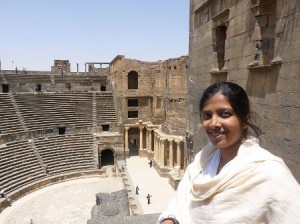
Professor Asma Sayeed at the Roman amphitheater in Bosra, Syria.
Scholars from around the world are drawn to Syria to study Arabic, Islam, and the history of world civilizations. The country has a rich heritage and is home to many archaeologically significant sites from a variety of time periods, making it a particularly awe-inspiring destination.
Asma Sayeed, assistant professor of religious studies, was among those drawn to the country for its wealth of history. From January to June of this year, Sayeed lived and worked in the Syrian city of Damascus, where she conducted extensive research about a community of medieval scholars that had an unusually high rate of participation by female religious scholars.
“Living and conducting research in Syria was incredibly easy and rewarding. Syrians are hospitable and welcoming. Although there are bureaucratic challenges, there were so many people who were eager to help and to facilitate my work that the challenges did not seem too daunting,” Sayeed says.
Her studies in Syria were supported by a Fulbright Fellowship, which allowed her to conduct archival research at the Al-Assad Library in Damascus, where she also visited many of the sites and neighborhoods where women are said to have been active as students and teachers.
Sayeed is the first scholar to conduct a detailed study of these women. Her work in Damascus included researching archival records of their daily activities and educational curricula and the extent of their scholarly influence.
While in Syria, she also enjoyed learning about women’s contemporary efforts to educate themselves in the religious sciences such as Quranic interpretation and Islamic law.
“For many centuries, Damascus has been an international center for Muslim education and one that has attracted many female Muslim scholars. It was wonderful to see how the city continues to maintain its reputation in that regard,” she says.
Sayeed’s interest in Muslim women’s education began in graduate school, where her dissertation examined trends in Muslim women’s participation in the transmission of religious knowledge across the span of approximately seven centuries. While working on her dissertation, she became aware of the medieval scholarly community that supported women’s religious learning.
“Examining the life of this one community allows me to examine other issues such as relations between Christians and Muslims during the Crusades, the impact of certain types of political patronage on the composition of the scholarly classes, and also to obtain new perspectives on sectarian and theological discourse in classical Islam,” Sayeed says.
Inspired by the knowledge she gained in Damascus, Sayeed will write about the community she is studying. She expects to publish her research over the next year or two, initially as articles dealing with the manuscripts she is reading, with a long-term goal of publishing a book on the subject.
Sayeed also sees many opportunities for integrating her Fulbright Fellowship experience into her teaching. For example, as she teaches students about feminism among Muslim women, she will include discussions about the women’s leadership and enthusiastic participation in religious learning that she witnessed in Syria.
“In a different vein, seeing the many rich layers of Christian history in Syria compelled me to rethink how I present Christianity in my Introduction to World Religions class. Given the fact that Syria is now a majority Muslim country, it is easy to overlook how much of formative Christian history happened in that area,” she says.
While she was in Syria, one of her former students, Al-Amin Kheraj ’08, visited her. “We went for a walk together in the Christian area of old Damascus, and he was amazed when I took him to the Chapel of St. Ananias, where St. Paul is said to have taken refuge and been baptized after his conversion to Christianity. In my own classes at Lafayette, I would love to have my students feel that same sense of wonder and discovery about the rich historical legacies in Syria,” she says.

1 Comment
Comments are closed.